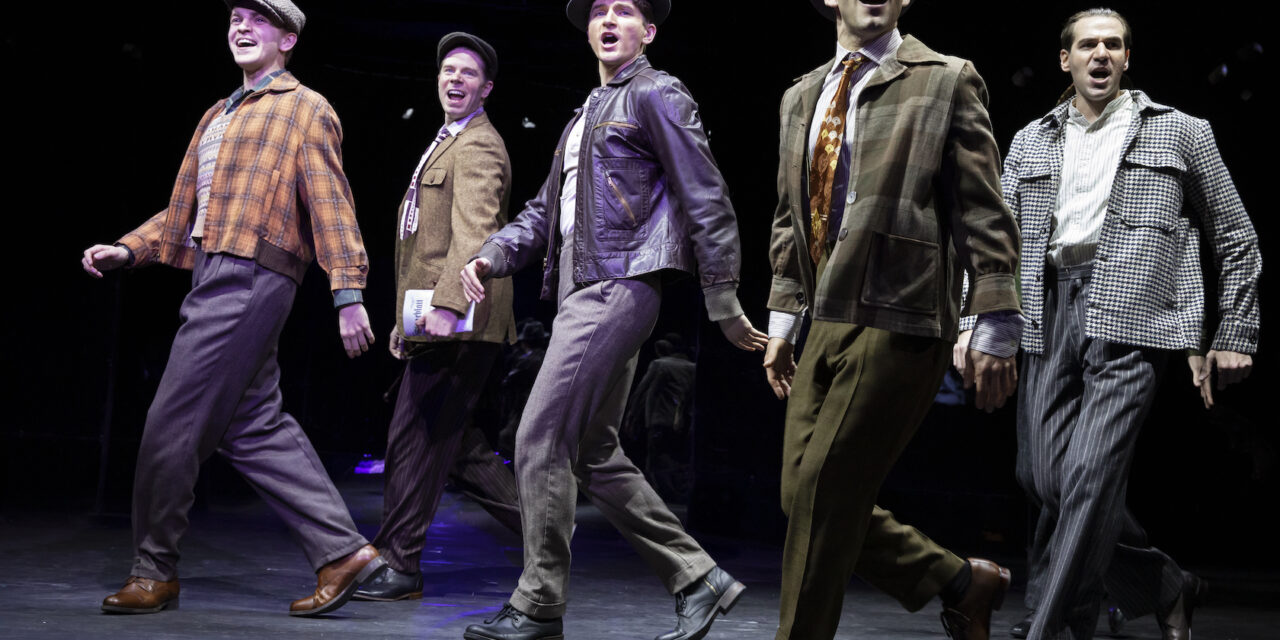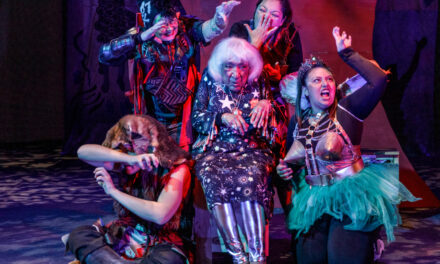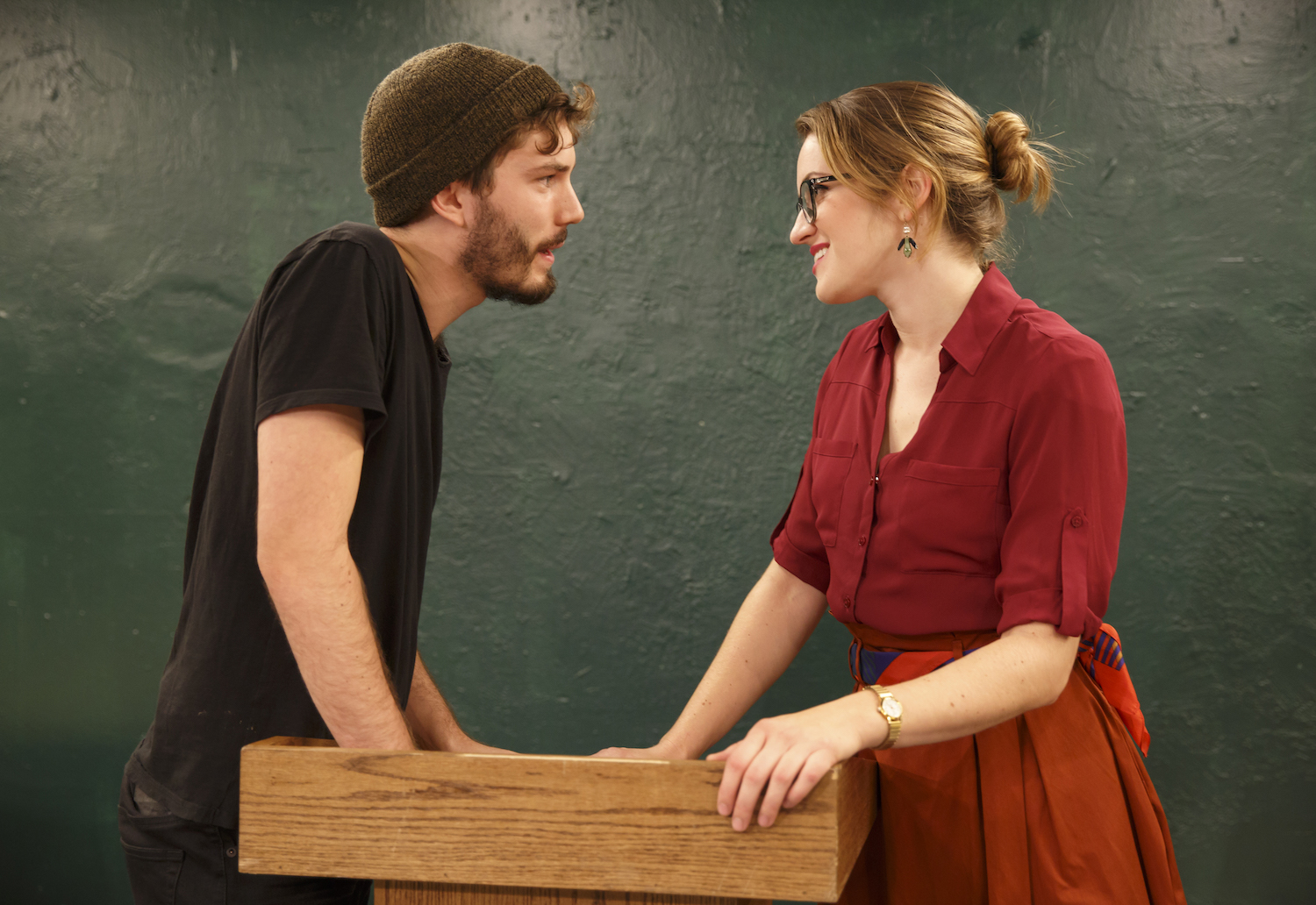By Samuel L. Leiter . . .
Berlin, the late 1920s, the Jazz Age, the rise of the Nazis, and the world of entertainers and cabarets, old friends. Such is the background of—sorry, no, not the one you’re thinking of—but Harmony: A New Musical, with music by beloved pop music icon Barry Manilow and book and lyrics by his collaborator of half a century, Bruce Sussman. Actually, Harmony, a passionate, relevant, yet nonetheless shaky work of politico-historical theater, is not “new,” despite its subtitle. Although its New York premiere was scheduled for 2020, just as Covid was beginning to cause havoc, and its next announced opening, in March 2021, was also postponed, the show’s inception goes back a quarter of a century.
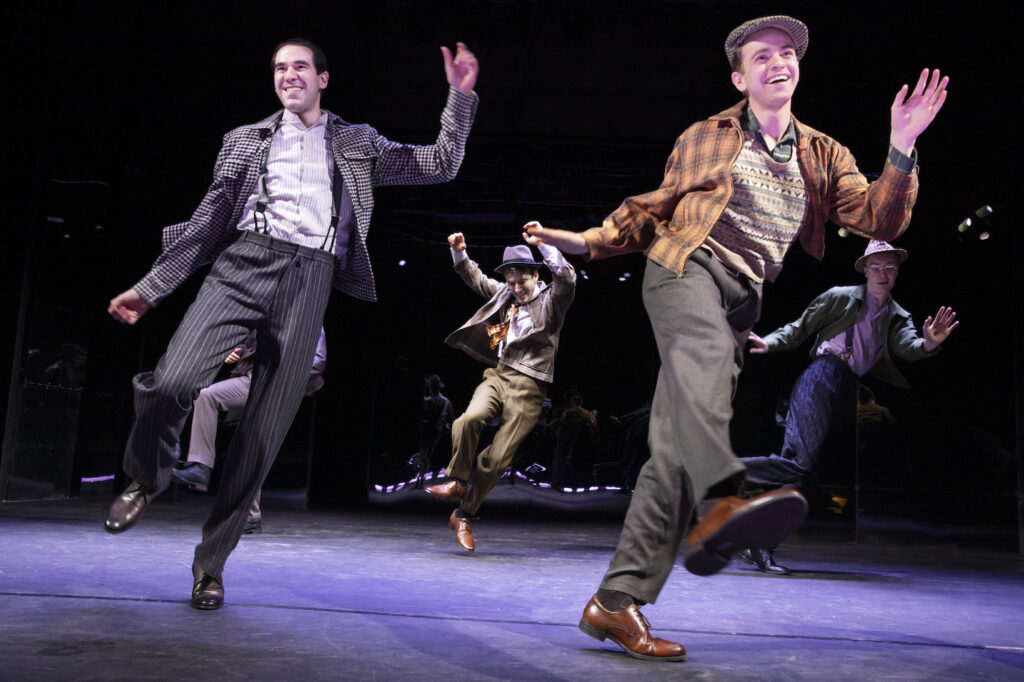
It debuted in La Jolla in 1997, and had later iterations in Philadelphia (2003), Atlanta (2013), and Los Angeles (2014), all the while aiming for the Big Apple. Now, reportedly having been extensively revised during the pandemic layover, it arrives at the Museum of Jewish Heritage’s Edmond J. Safra Hall in a National Yiddish Theatre Folksbiene production—in English, by the way—that even the vibrant staging of Tony-winning director-choreographer Warren Carlyle (The Music Man), and the efforts of a seriously talented ensemble, cannot bring fully to either comedic, musical, or emotional heights.
Harmony tells the true story of the Comedian Harmonists, a sextet of singer-comedians who rocketed to fame during the Weimar Republic, gaining international fame (even playing Carnegie Hall in 1933), producing many hit records, and appearing in over a dozen films. However, three of them were Jewish and one was married to a Jew named Ruth (Jessie Davidson), who—as expressed in a dynamic red flag-waving number—also was a communist activist.


As the episodic show progresses, the political background comes sharply into focus as Hitler becomes the Fuehrer, and the Jews and their art turn into targets of discrimination. A key scene takes place when the group is performing in New York and its members argue about the wisdom of returning to Germany, ultimately deciding to do so. Despite this unwise decision, and their imminent dissolution when the German government declares their work degenerate, a narrative recap informs us that they all survived the war. However, the group itself was dead and its legacy nearly liquidated.
During the overlong course of two and three-quarter hours, the story is told largely through the memory of the 87-year-old “Rabbi” (Chip Zien), who had abandoned the bima for the stage, and whose youthful persona is present as the “Young Rabbi” (Danny Kornfeld). The show’s construction allows Mr. Zien to become the central figure as he looks back with both fondness and regret over the distant past, often expressing his fruitless frustration at the mistaken choices of his younger self. This becomes dramatically problematic when he exclaims that Young Rabbi, riding on a train also carrying Hitler, should have grabbed a gun and, even at the cost of his own life, killed the Fuehrer. As if.
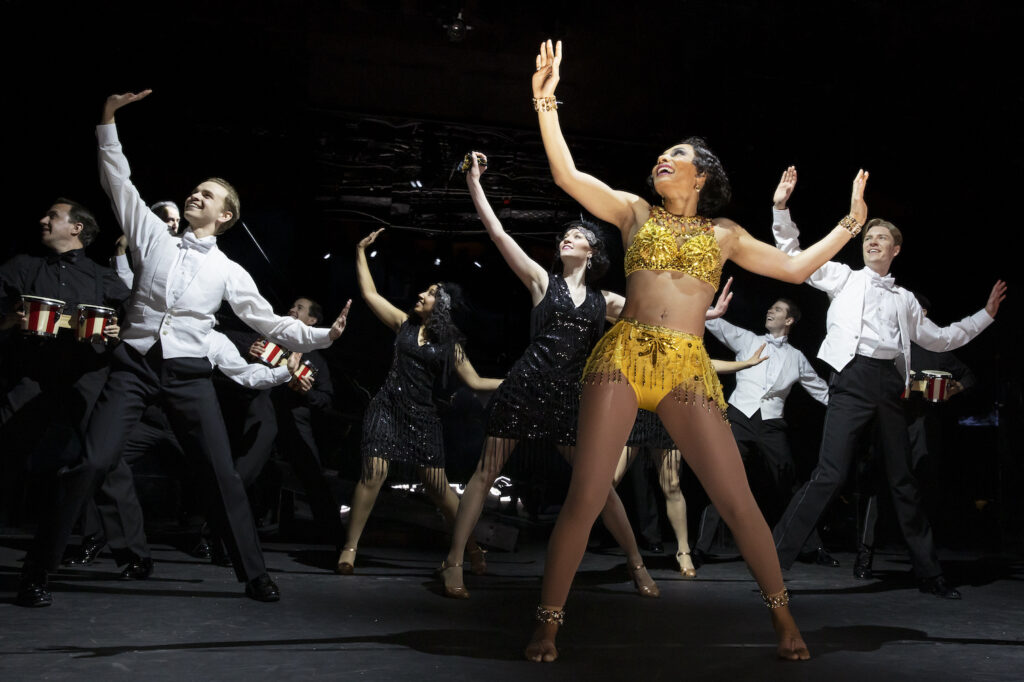

The veteran Mr. Zien (Into the Woods), giving his most prominent performance in years, is also asked to change wigs and costumes to play multiple other roles to portray people like Albert Einstein and Richard Strauss, a comedic device that quickly runs dry. (Someone also thought it cute to give each of these roles a phony actor name in the cast list.) In one rather painfully unfunny bit, he appears in blonde-wigged drag impersonating Marlene Dietrich doing her top-hatted, tuxedoed, high-heeled, leg-baring “Blue Angel”-type routine. When it comes to comedy, the Comedian Harmonists click more as harmonists than comedians.
However pertinent the subject matter, which reminds us instantly of the Russian invasion of Ukraine, and its theme of the need to find harmony in our human relations—as the Comedian Harmonists did in art and life—Mr. Sussman’s book, covering multiple “heroes” and events over a six-year period, relies mainly on skin-deep impressions of personalities and circumstances. We know in our brains what they are enduring, but the essential gut-wrenching never happens. It comes closest in Mr. Zien’s eleven o’clock number, “Threnody,” into which he pours every bit of feeling in his bones, but by then it’s too late.
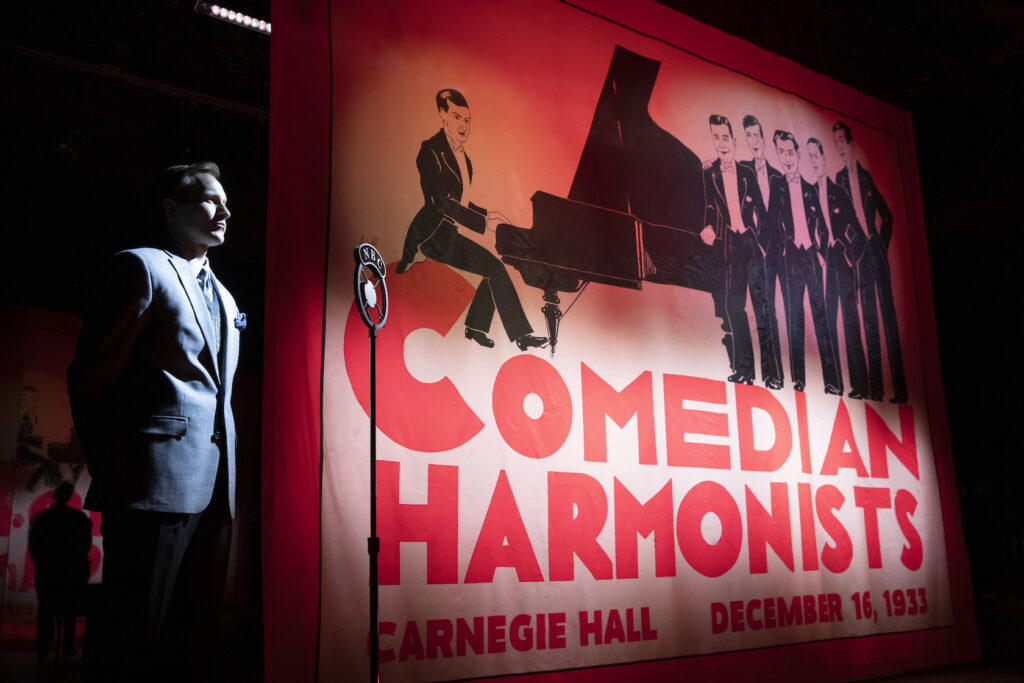

Regardless of the significant subject matter, the draw here is surely Mr. Manilow’s music—none of which, however, rises to the level of his great pop hits. Still, several numbers inspire a wish to hear them again, among them the soulful “Every Single Day,” sung by Young Rabbi. Sierra Boggess (School of Rock), as his beautiful, blonde wife, Mary, sings so enchantingly she makes her so-so numbers, like “What Do You See,” sound better than they are. (Her acting, however, is unable to overcome the role’s overwhelming blandness.)
A lively revue-type number called “We’re Goin’ Loco!,” set in an imaginary Ziegfeld Follies of 1934, showcases the famed Black star Josephine Baker (Ana Hoffman), shimmying (think “twerking”) her butt off, but only makes you realize how greatly something on the level of Mr. Manilow and Mr. Sussman’s “Copacabana” might have worked here to really blow the roof sky-high.
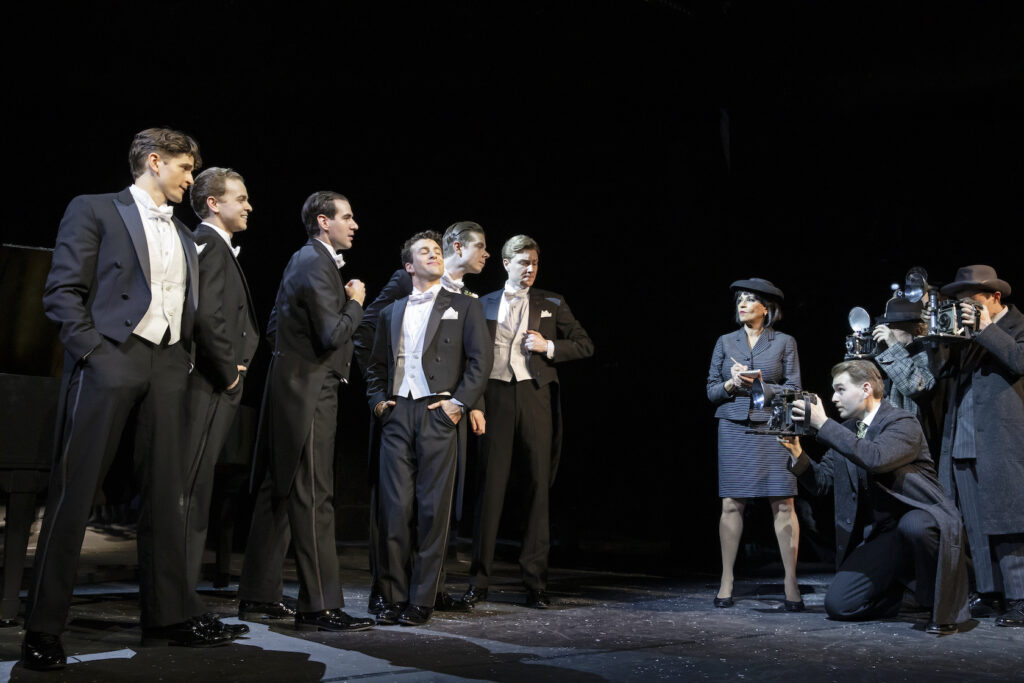

Warren Carlyle’s invigorating choreography is a major saving grace, and his Comedian Harmonists show remarkable versatility as both singers and dancers: watch, for example, as they crouch and kick their way through the gypsy-inflected “Hungarian Rhapsody #20.” Or witness the super-clever “Come to the Fatherland,” where they perform in Copenhagen’s Tivoli Park as German marionettes. Their names: Blake Roman, Steven Telsey, Zal Owen, Eric Peters, Sean Bell, and, of course, Mr. Kornfeld. If you want to hear the originals, in barely accented English, here they are, singing Cole Porter’s “Night and Day,” whose gentle manner, by the way, is nothing like the more overstated musical personality they display in Harmony.
Beowulf Boritt provides a relatively simple setting backed by a mirrored wall and supplemented by props and subtle units to represent the many locales (times and places are noted in projections); Jules Fisher and Peggy Eisenhauer provide their legendary lighting magic; and costume designers Linda Chō and Ricky Laurie capture the period with panache.
With its large cast and, for an Off-Broadway show, obvious expense, Harmony looks like it has Broadway aspirations. Regardless of the obstacles it’s already overcome, though, it still lacks the creative propulsion such a leap would require.
Harmony: A New Musical. Through May 8 at the National Yiddish Theatre Folksbiene Edward J. Safra Hall/Museum of Jewish Heritage (36 Battery Place, Downtown Manhattan). www.nyft.org
Photos: Julieta Cervantes


